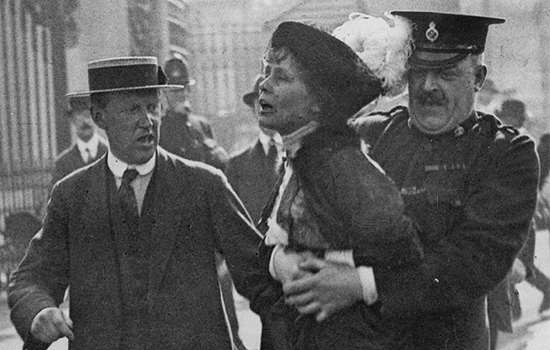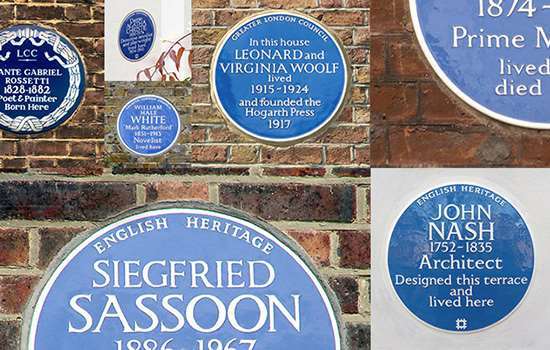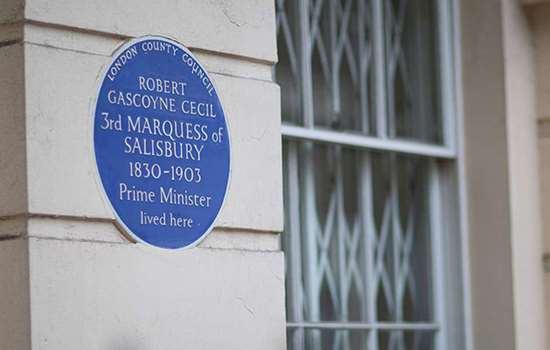MARX, Eleanor (1855-1898)
Plaque erected in 2008 by English Heritage at 7 Jews Walk, Sydenham, London, SE26 6PJ, London Borough of Lewisham
All images © English Heritage
Profession
Socialist Campaigner
Category
Philanthropy and Reform, Politics and Administration
Inscription
ELEANOR MARX 1855-1898 Socialist Campaigner lived and died here
Material
Ceramic
Eleanor Marx is an important figure in the history of both working class and women’s emancipation. She was at the heart of the early trade union movement and also campaigned extensively on behalf of female and Jewish workers. She lived at 7 Jews Walk in Sydenham from 1895 until her death in 1898.
EARLY POLITICS
Jenny Julia Eleanor Marx, known as Eleanor or ‘Tussy’ to her friends, and later as Eleanor Marx–Aveling, was born at 28 Dean Street in Soho, where a plaque commemorates her father, Karl Marx. She grew up in an atmosphere thick with Shakespeare and politics and by the age of seven was writing letters of advice to Abraham Lincoln. Her mother described her as ‘political from top to toe’.
She became a strong supporter of the Fenian cause for Irish Independence after a visit to Ireland with Friedrich Engels in 1869, and was introduced to serious political activism in 1871 when she joined the socialist cause against the suppression of the Paris Commune. She helped organise aid for French refugees in London and was herself briefly arrested on a visit to Paris in August 1871.
From 1873 until her father’s death in 1883, she spent much of her time caring for her ill parents. Marx still pursued her literary interests, however, and visited the British Museum to work for the Frederick Furnivall’s Philological, Chaucer, and Shakespeare societies. Later she would produce the first English translation of Gustav Flaubert’s Madame Bovary and even learned Norwegian in order to translate Henrik Ibsen.
SOCIALISM AND FEMINISM
After her father’s death Marx started her own political career in earnest. She joined the executive committee of the Social Democratic Movement, but left in 1885 to form the Socialist League with William Morris and Edward Bibbins Aveling. She lived with Aveling, a married man, from 1884 until her death. Together with Engels the couple became a leading, if disruptive, presence in the English socialist movement. Both were charismatic orators, and gave frequent public addresses, touring America in 1886 and 1888. In 1889 Marx helped to organise the founding congress of the Second International in Paris, acting as a translator and interpreter.
During this time Marx and Aveling co-authored the treatise The Woman Question (1886). For this work Marx has been called the ‘mother of socialist feminism’, turning the so-called ‘woman's question’ into the ‘workingwoman debate’.
WORKERS’ RIGHTS
From about 1889 onwards Marx campaigned with and on behalf of workers. She was at the heart of the development of the New Unionism, sitting on the council of the National Union of Gas Workers and General Labourers. A forceful presence in the campaign for the eight-hour day, and in the dockers’ strikes of 1889, she was particularly admired for her work in helping women organise their own branches, speaking passionately in support of unity of purpose and equal pay.
Marx was also active in support of Jewish workers in the East End, whose religion and recent arrival excluded them from the main body of the working class movement. She herself was the descendant of German Jewish immigrants.
PREMATURE DEATH
At the age of 43 Marx died at 7 Jews Walk by swallowing prussic acid. She had discovered in 1895 that Freddy Demuth, whom Engels had called his son, was in fact Karl Marx’s son, and she was ashamed of her father's treatment of him. In addition Aveling had been duplicitous throughout their relationship – both sexually and financially – and in 1897 she discovered he had secretly married another woman.
She was initially happy at number 7 however, living there from 1895 until her death in 1898. She wrote in November 1895 that ‘The house we are about to buy... (Edward swears this is my only reason for wanting it) is in JEWS Walk, Sydenham’. She also loved the garden, and made plans for growing vegetables and keeping pigeons.
Will Thorne remarked that, had she lived longer, Marx ‘would have been a greater women’s leader than the greatest of contemporary women’.


